GirlsGetMath
- Is a five-day non-residential program open to 20-25 high schoolers, regardless of gender, who will be rising 10th or 11th-grade students at the time of the program
- Occurs at Brown University’s Institute for Computational and Experimental Research in Mathematics (ICERM)
- Seeks to motivate young adults to consider careers in mathematics, computation, and quantitative fields
- Provides an affirming environment that encourages participants to explore, and invites them to excel in, the mathematical sciences
- Incorporates interactive lectures, hands-on activities, and games that help bring home mathematical concepts in fun ways
- Has daily computer-labs to introduce participants to programming skills and coding
- Covers topics like cryptography, the mathematics of voting, image processing, fractals, prime numbers and factoring
- Is taught by accomplished professors, undergraduate and graduate teaching assistants, all serving as career models and scientific mentors
- GirlsGetMath@ICERM is currently led by Amalia Culiuc, lecturer in Applied Mathematics at Brown University.
Expanding the Program Nationally
ICERM’s long-term goal has been to replicate GirlsGetMath on a national basis, and started by making its interactive and engaging educational modules now available on-line by request in 2016 (see Curriculum below).
Thanks to funding from the JetBlue Foundation in 2018, ICERM developed a train-the-trainer opportunity for nine faculty who were interested in replicating a GirlsGetMath program at their home institutions. The observational training occurred during ICERM’s summer 2019 GirlsGetMath program. The train-the-trainer participants were then given the opportunity to apply for start-up seed funds to run their own programs. Six out of the nine trainees applied for the four available seed grants. Through the seed grants, GirlsGetMath programs were held at Boston University, Colorado State University, Stonehill College, the University of Central Oklahoma, and the University of Michigan - Dearborn. We are grateful to the JetBlue Foundation for their flexibility.
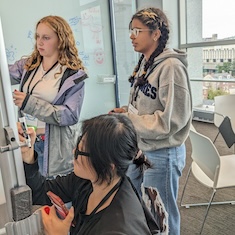
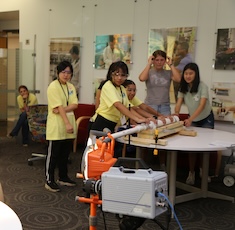
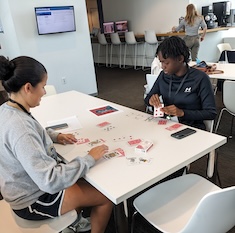
How You Can Make a Difference
Donations and gifts to the GirlsGetMath@ICERM program can come in many forms. A gift as small as $100 will cover the cost of one participant’s experience; a $50,000 donation will seed the planned national franchise of this program. Gifts and donations can be named or anonymous.
- $50 provides games and art supplies for students
- $100 funds a scholarship for one student to attend the program
- $500 funds two Alumni Counselors
- $25,000 sponsors one summer GirlsGetMath program
- $50,000 provides seed funding for a GirlsGetMath franchise
All gifts to GirlsGetMath@ICERM program are tax-deductible to the extent allowed by federal law under the umbrella of Brown University’s status as a 501(c)(3) charitable institution.
Give Now
Donate to ICERM online at https://gifts.brown.edu
Comments & Feedback about GirlsGetMath
Recent Press and Write-ups about GirlsGetMath
In 2022, Brown University released an article featuring reflections from GirlsGetMath alumnae and faculty leaders.
Brown University’s student newspaper, the Brown Daily Herald featured an article about the 2018 GirlsGetMath@ICERM program.
Brown University released an article about GirlsGetMath 2024 in News from Brown.
GirlsGetMath organizer Katharine Ott wrote a guest post on the American Mathematical Society blog about the 2017 GirlsGetMath program. Visit the AMS blog to learn more about the event.
GGM 2024 Alumni Feedback
"I really liked the activity where we learned how to change colors of an image on [MATLAB] because I found it really exciting to experiment with different numbers and see which colors it would create."
"I enjoyed visualizing concepts with [MATLAB] the most. It was cool to see what we learned in the lecture come to life. I also really enjoyed helping people out with the code, it was amazing when they finally got it to work."
"I enjoyed the mini games we played, especially applying the SET card game into math. I never thought about the deeper probability inside of a card game, and thinking about the math incorporated into the game actually helped me realize the broader possibilities a simple deck of cards can do."
"My favorite topic was the data science lecture Anarina did on Friday. It kept me extremely engaged and made me think further into the topic. The lecture really changed my perspective on public health and data science. I am now a lot more interested in it and am considering furhter [sic] learning into the topic."
GGM 2024 Parent & Guardian Feedback
"My daughter already loved math going into this program, but now she has an excitement about how she can do math in her career."
"[My student] loved using MATLAB and was very excited to use it to explore mathematical concepts (such as the Fibonacci Sequence ) that she had previously only read about. She came home daily excitedly recounting new concepts or explorations, like how graph theory can used for movie recommendations. The program reinforced for her (and for us) how much she really loves math, and we are confident she will continue pursuing a STEM education and career."
"This provided her the opportunity to meet other students as excited about math as she was and also hear more about studying math in the future."
"[My student] benefitted from interacting with engaging Math Instructors, fellow Math-minded girls and using Math to solve problems. She was both stretched and encouraged. Each day was well-organized, challenging and fun!"
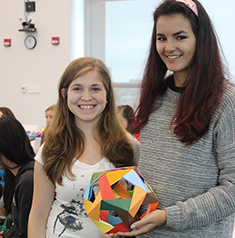
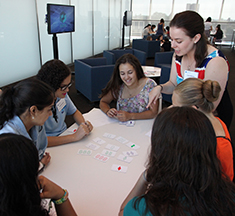
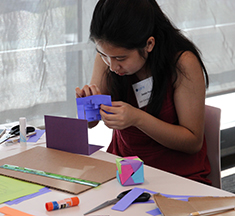
Curriculum
GirlsGetMath Curriculum Overview
ICERM makes modules of its GirlsGetMath curriculum available to high school STEM teachers looking for challenging material for their students, and to college or university faculty members interested in replicating a GirlsGetMath program at their institutions (see sample GirlsGetMath program schedule). These curriculum modules have been developed and vetted over time at the GirlsGetMath@ICERM program (see a summary of the available curriculum modules).
GirlsGetMath Video Module Overview
The GirlsGetMath faculty leaders have developed a small selection of online modules related to the GirlsGetMath curriculum. They consist of the following videos that interested students can complete on their own or with a teacher’s guidance.
Lab: An Introduction to vectors and matrices in Octave
In this lab you will learn how to perform matrix computations in Octave, a free numerical software that uses a language compatible with MATLAB. To perform the operations below, point your web browser to octave-online.net. For this entire lab, you will only need to enter lines of code into the Octave Command Prompt. No sign-in is necessary.
Materials and Resources
Lab: Recommendation Systems
In this lab you will work through some examples of the computations needed to create a basic recommendation system and then go on to make a recommen- dation system based on a sample of survey data. The activities below are written to be completed using Octave, which you can access at octave-online.net. To become familiar with basic matrix and vector commands in Octave, it is recommended that you complete the introductory lab before this activity.
Materials and Resources
Lab: Modular Arithmetic
This module introduces modular arithmetic, sometimes known as "clock arithmetic." The module covers basic properties of addition, multiplication, and multiplicative inverses modulo n.
Materials and Resources
Lab: Modular Arithmetic and Cryptography
In this lab we will practice modular arithmetic and encoding/decoding messages using Octave, which you can access at octave-online.net.
Materials and Resources
Acknowledgements
With appreciation to the following sources: